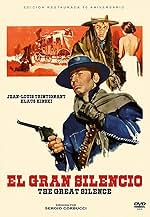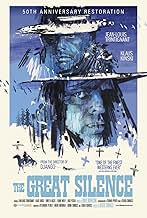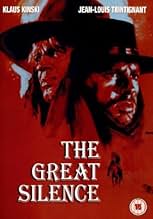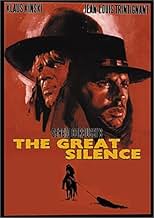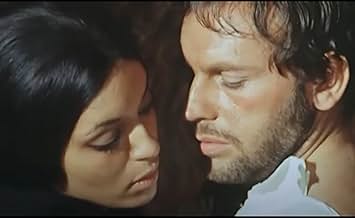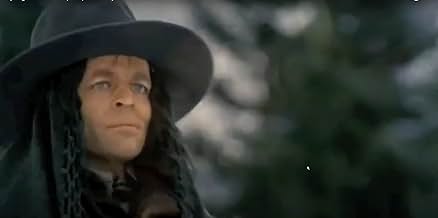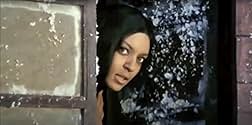Un tireur d'élite muet prend la défense d'une jeune veuve et d'un groupe de hors-la-loi contre un gang de tueurs à gages durant l'hiver 1898, et une lutte sinistre et tendue en découle.Un tireur d'élite muet prend la défense d'une jeune veuve et d'un groupe de hors-la-loi contre un gang de tueurs à gages durant l'hiver 1898, et une lutte sinistre et tendue en découle.Un tireur d'élite muet prend la défense d'une jeune veuve et d'un groupe de hors-la-loi contre un gang de tueurs à gages durant l'hiver 1898, et une lutte sinistre et tendue en découle.
- Réalisation
- Scénario
- Casting principal
- Récompenses
- 1 victoire au total
- Silenzio
- (as Jean Louis Trintignant)
- Pauline Middleton
- (as Vonetta Mc Gee)
- Governor of Utah
- (as Carlo D' Angelo)
- Outlaw
- (non crédité)
- Man in Saloon
- (non crédité)
- Poker Player
- (non crédité)
- Hunter
- (non crédité)
Avis à la une
In the mountains of Utah, starving citizens of the town of Snow Hill are forced to steal to feed themselves, and in turn have to hide in the mountains with a price on their head. The corrupt banker and Justice of the Peace Pollicut (Luigi Pistilli), encourages bounty hunters to hunt them down, as he makes a percentage on every 'bandit' brought in. However, the persecuted folks have help in the form of Silence, who really, really hates bounty hunters – and with good reason. Silence will only fire upon someone if they draw first, and he also likes to shoot the thumbs off bounty hunters, as Pollicut knows too well.
Worst of all the bounty hunters is Loco (Klaus Kinski), who doesn't even care why people have a price on their heads, as long as he gets the money, and there's no 'dead or alive' where Loco is concerned. If they're dead, he doesn't have to feed them. Loco kills the husband of Pauline, who returned from exile to visit his wife, and she hires Silence to kill him. Loco knows that Silence is too fast for him, and will not be drawn into a gunfight yet.
There's also a new Sheriff in town that quickly twigs that things aren't quite right in Snow Hill. Burnett (Wolff, playing the only character approaching 'comic relief'), does not agree at all with Pollicut and Loco's tactics, even going so far as to arrest Loco and take him elsewhere for a trial.
That's enough plot! There's loads going on in this film, and plenty of it must have been quite daring for 1968. The interracial sex scene between Silence and Pauline for starters (and the music during this bit is outstanding, even for Morricone!), the bloody violence with headshots being a speciality, and the ending! The ending! Jesus! Buddha! Brian Blessed! The ending! Indy! The ending! I will not reveal it here, but it's certainly not something you encounter very often, in any genre. Jaw-dropping.
The acting is also faultless too, even if it is dubbed. Klaus Kinski is very restrained for the most part, but still comes across as a polite, malicious, sadistic murderer who is also smarter than everyone else. This might possibly be the best film I've seen him in. Luigi Pistilli isn't too far behind either. He's cowardly and scheming and likes to make others do his dirty work (mainly Mario Brega, who meets a gory end that stands out). Frank Wolff jumps between comedic and serious as the only male character in possession of a soul. His character follows the law to the letter, which may be a mistake in the hostile environment of Snow Hill. I'm not familiar with the actress that plays Pauline but she also stands out as a woman channelling her grief into one simple task – to kill Loco.
This one gets the highest recommendation for me!
The circumstances leading up to this showdown should, in a more conventional western, be pretty clean-cut. But what's impressive, if almost a little circumstantial, is that Corbucci puts in little unconventional markers along the way: the high-drama scene where Silence gets his hand burnt by a goon as foreshadowing for the ominous bounty hunter massacre, and for those little moments when life seems so easily killed off, particularly at the start. Silence, like in a Leone film, does have something of a gimmick as a killer, as he shoots off the thumbs of his targets. But Corbucci's drama isn't keened on incredible suspense sequences in operatic form or gallows humor. Even a sex scene for Corbucci has a tenderness to it that feels the work of someone trying to break out of squarely B-movie extremities and trying for something more. If it isn't altogether successful it's attributable to flaws scattered around: random 'soft-lighting' in the last act that is very distracting, a couple of plot points not totally clear even by the end, and Kinski looking sometimes like a pretty boy as much as a sadistic bounty hunter, plus Corbucci's tendencies to favor close-ups for more formulaic means as opposed to drawing out deeper emotions through a more keen system.
But even with Corbucci not being a 'great' director, he has a keen eye for Utah (if it is Utah, which it probably isn't), and the vast vistas of snow and fields in a plain sight that contrasts the sort of void sucking the characters in with the hopeless center of bounty hunters without the strongest opponent. And Morricone, as if it was like breathing, fleshes out scenes so well with his beautiful score, only slightly below the magnificence of a Leone picture. You may feel by the end that it's not the prettiest western you've ever seen, but it has that possibility in its low-budget blood-stained manner to stay with you long after it's over.
IL GRANDE SILENZIO is more pessimistic but also more human than any western by Leone or Peckinpah. It may not be a pleasant experience, but if you want to see a masterpiece of cinema instead of a traditional western, it is definitely worth waiting in line for.
If you like Sergio Leone's films (such as THE GOOD THE BAD AND THE UGLY and A FISTFUL OF DOLLARS) then you'll probably enjoy this film by Sergio Corbucci. Violence, shooting, cussing, strange costumes, haunting music, trademark camera angles and the Italian style go to make up one of the best (lost)westerns I've ever seen.
These films aren't to everyone's taste, but THE GREAT SILENCE is worth watching just to hear the main theme tune which is a fantastic work of latterday composition - it sounds daft but I nearly cry when I hear it sometimes. By turns the score is dream-like, stylish, menacing, bizarre and even ridiculous (twanging sitar-like sounds). This is my favourite piece of Ennio Morricone's music.
As I said before the main reference points for this film are those of Sergio Leone, except for the snow-laden setting and the distinct lack of humour( THE GOOD THE BAD AND THE UGLY still makes me laugh, despite countless watching). Having said that this film has a distinctly original atmosphere of it's own, brought out in the brilliant and shocking ending. the director went to great lengths to preserve his radical finale (particularly unpopular with the producer) - there is a version of the film with a cop-out ending.
In short then, this is a great movie despite all the shortcomings of the particular genre( I'm not saying anything)- I once read that the term "Spaghetti Western" was a derisory one used by American film critics - but I can't think of any American westerns as enjoyable as some of these Italian films.
This widely deemed picture , unlike most conventional Spaghetti Western , contains exceptional setting , colorful images with a sensational cinematography by Silvano Ippoliti and features a sensitive musical score by the classic Ennio Morricone . This splendid Western results to be a remake to Japanese Samurai TV series starring Shintarô Katsu (1973) . Jean-Louis Trintignant agreed to play in a spaghetti western under the condition that he did not have to learn any lines for the role , that's why the main character conveniently became a mute in the story. Nice production design and the snow in the town of Snow Hill was created by gallons of shaving cream . The movie was widely inspired by ¨Day of outlaw¨ (Andre de Toth with Robert Ryan , 1959) and set in 1898 in a small town called Snow Hill where is developed a massacre . The motion picture was originally directed by Corbucci and displays a twisted finale with dark surprise included . As trivia, explaining that Trintignant didn't know English , language used during filming , and Marcello Mastroiani, Sergio Corbucci's friend , suggested him playing a mute gunfighter named Silence , resulting to be the film title . Rating : Better than average . Indispensable and essential seeing for SW lovers.
Le saviez-vous
- AnecdotesAccording to Sergio Corbucci, Marcello Mastroianni gave him the idea of a mute gunfighter when the actor told him that he had always wanted to do a Western, but unfortunately didn't speak English. When Corbucci first met Jean-Louis Trintignant, he learned that he didn't speak English either. Because he had a fascination with characters with a crippling weakness, Corbucci decided that this was the moment to turn the taciturn Spaghetti Western hero into a mute.
- GaffesOn the map in the governor's office, the state of Nevada is identified as Utah.
- Citations
[English subtitled version]
Pauline Middleton: Once, my husband told me of this man. He avenges our wrongs. And the bounty killers sure do tremble when he appears. They call him "Silence." Because wherever he goes, the silence of death follows.
- Versions alternativesTwo alternative endings were created for this film:
- A "happy" ending, in which Sheriff Burnett (having somehow survived being trapped under a frozen lake) rides into town and shoots Loco before he can kill Silence, allowing him to kill the remaining bounty killers. This ending was once believed to be shot for the North African and Japanese markets, but has since been revealed to have been created as an alternative solution for the producers, who wanted the film to have a "seasonal" (ie. Christmas) appeal.
- A lesser-known, "ambiguous" re-cut of the original ending with additional footage, in which Silence is wounded, but Loco gestures to his gang members to leave the saloon before they can kill anyone.
- ConnexionsFeatured in Western, Italian Style (1968)
Meilleurs choix
- How long is The Great Silence?Alimenté par Alexa
Détails
- Date de sortie
- Pays d’origine
- Langue
- Aussi connu sous le nom de
- El gran silencio
- Lieux de tournage
- Cortina d'Ampezzo, Belluno, Veneto, Italie(location scene)
- Sociétés de production
- Voir plus de crédits d'entreprise sur IMDbPro
Box-office
- Montant brut aux États-Unis et au Canada
- 53 074 $US
- Week-end de sortie aux États-Unis et au Canada
- 8 755 $US
- 1 avr. 2018
- Montant brut mondial
- 60 500 $US
- Durée1 heure 45 minutes

